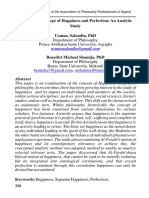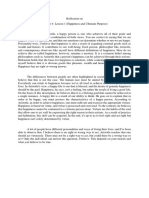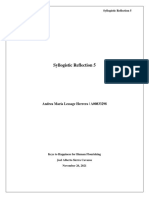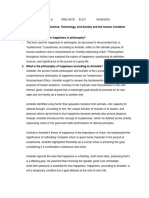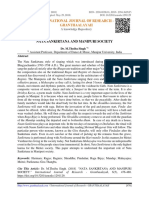Happiness is a mental condition where humans experience a range of positive emotions, from a
simple sense of contentment to real joy. Happiness can be achieved in various ways, not only
through feelings of gratitude, love, and connection with others, but also through attaining well-being
and satisfaction in life. Happiness is a fundamental need that people seek to maintain for their well-
being, with many striving for it, often working hard and making sacrifices to achieve true happiness.
In Islam, happiness is seen as a holistic state that includes fulfilment and emotional well-being. As
servants of Allah, we need to understand the purpose of our life and how to achieve success in this
life and life after death. "An Analysis of Al-Ghazali's Thought on Happiness," explores the
philosophical insights of one of the most influential Islamic philosophers Al-Ghazali, particularly
through his work "The Alchemy of Happiness." This article focuses on his views on happiness from an
Islamic perspective, where Al-Ghazali expresses that true happiness can be achieved through
spiritual fulfilment and the pursuit of knowledge and virtue.
- Al-Ghazali considered the soul a spiritual component that must be continually tended to and
cleansed for the individual’s inner health
- Al-Ghazali emphasized the importance of the soul, intelligence, and lust in creating
happiness.
- The source of happiness is a profound appreciation of Islam through religion, piety, a
comprehension of the creed, and the collection of knowledge. Happiness based on lust alone
is fleeting, annoying, and damaging. It will be meaningless when a guy is only preoccupied
with material belongings and worldly affairs
- Muslim scholars did not ignore how similar Aristotelian ethics and Qur'anic ethics are.
- According to his line of reasoning, the true character of a human being is said to be
contained within one's heart or inner soul, which has an ideal and heavenly nature and is
kept in the treasury of forms that God maintains (Ambrozy, 2021)
- significance of happiness lies in the otherworldly nature of this state. There is no limit to the
varieties of pleasure, and nothing can detract from the experience of having them
- as pleasure and quantitative satisfaction from Protagoras
- “The created soul is made for the afterlife. Its job is to seek happiness; its satisfaction is
spiritual knowledge of the Almighty God
- mind, body, and senses is to help the soul escape the material world, where it is trapped,
and reach the spiritual goal it is made for.
- blessing of Almighty God, utilizing physical, spiritual, and material elements. This is because
Al-Ghazali perceived happiness as a gift from God
- AlGhazali acknowledge the necessity of fulfilling physical and material needs, but he
cautioned that even the lawful luxuries of life can lead to arrogance, carelessness, and
various vices.
- But this compromise is not compatible with the quest for pleasure. Ghazali’s moral theology,
which is based on the hierarchical social paradigm acquired by medieval Islamic civilization
from late antiquity, is elitist in its broad strokes. T
- Ghazali defines happiness in The Alchemy as the knowledge of God.
- Only some people can walk his path to divine understanding
�encompasses the practice
Al-Ghazali's Concept of Happiness
The author explains that Al-Ghazali's philosophy views different aspects of happiness, where the soul plays a critical role in
balancing personal desires and the heart's love for Allah. In his work The Alchemy of Happiness, Al-Ghazali saw happiness as
a gift from Allah. He believed that true happiness comes from living as a servant of Allah in a way that pleases Him. This
emphasizes the point that true happiness can be achieved by becoming a faithful Muslim who has a strong connection with
Allah (S.W.T.) and follows Islamic rules and principles closely.
In instances, Al-Ghazali's ideas on happiness focus not just on our outer selves but more directly on our inner selves, known as
souls. According to Al-Ghazali, just as our physical bodies need regular exercise and healthy food to sustain our health, our
souls also need proper care and fulfillment. We should nurture our souls with sincere intention, regular prayer, recitation of the
Quran, repentance to Allah (S.W.T), charity, fasting, good deeds, seeking knowledge, and sincere intentions toward others.
Furthermore, he stated that souls tended with pure and heavenly energy, contained within one's heart, can connect to the
divine and are connected to Allah S.W.T.
Al-Ghazali emphasized the importance of reason and intellect in the pursuit of happiness, as they help us make wise decisions about our
actions and desires. For example, when we feel the urge to spend or invest in things we desire but don't actually need, using reason can
help us decide if we truly need them for daily use or if it’s just a passing desire. While it’s normal for us to have material and physical
desires, we should be careful not to rely on them too much, as this can be harmful. Uncontrolled desires can lead to negative traits like
arrogance, carelessness, and a lack of morals. This is why Al-Ghazali encouraged moderation and self-control, ensuring that our desires do
not distract us from our higher purpose in life. He recognized that it is necessary to meet our physical and material needs, such as food,
clothing, and shelter, but he warned against overindulging in luxuries. For instance, Ultimately, Al-Ghazali believed that true happiness
comes from living a balanced life marked by moderation.
Al-Ghazali's thoughts on happiness emphasize that true fulfillment comes from a deep understanding of oneself and a connection with
God, advocating for moderation and self-control in fulfilling desires. He views happiness as a holistic state that transcends material wealth,
intertwining ethical behavior and spiritual growth. In contrast, Aristotle defines happiness as "eudaimonia," or flourishing, achieved
through the practice of virtues and rational living. While both philosophers recognize the importance of moderation, Al-Ghazali focuses on
the spiritual dimension of happiness, warning against excessive desires that can lead to moral decay, whereas Aristotle emphasizes the
cultivation of virtues and rationality within a community context. Ultimately, Al-Ghazali's perspective is rooted in Islamic spirituality, while
Aristotle's framework is more secular, highlighting the differences in their approaches to understanding happiness within their respective
cultural and philosophical traditions.
Al-ghazali views on happiness expressed more on true fulfillment comes from a deep understanding of oneself and a
connection with God, mentioned that Each
part of the soul delights in that for which it has been created. But
the highest function of the soul is the perception of truth, as he viewed this a holistic state that
transcends material wealth, however Aristotle defines happiness as "eudaimonia," or flourishing,
achieved through the practice of virtues and rational living.
Aristotle’s a significant role in influencing Al’Ghazhali views on the discussion of happiness context in the research. As Aristotle focuses
more the typical forms fo model of while Al- Ghazali In contrast happiness that contribute to human progress in practical approach to
ethics, he expressed that happinness can be gain by normal human being through means in everyday life Ghazali presents a more different
direction of view of happiness that contains religious values such reserved for connection towards gods ,prophets, and spiritual
purification. This perspective can diminish the value of ordinary forms of happiness that Aristotle acknowledges as essential for human
development. This refer to the values of desire of human that should be moderate as it lead to negative effects tat could affect one
happineese in contrast from Aristotle's perspective, which embraces many ways to find happiness, including those strive for to material
success and achievements. Aristotle believed that happiness can come from various areas of life, such as personal achievements,
friendships, and enjoying life's pleasures. He acknowledged that people can experience joy in many forms, not just through spiritual or
moral activities
In summary, Aristotle's influence on the concept of happiness is evident in the contrasting views presented by al-Ghazali. While Aristotle
emphasizes practical happiness accessible to all, al-Ghazali focuses on a more idealized and spiritual understanding, which may not
resonate with the everyday experiences of most individuals.
We are all born with a “knowing pain in the soul,” which causes us to seek happiness, but
most of us seek substitute pleasures deriving from the body which cannot resolve a pain that
is essentially spiritual.
In conclusion, the paper highlight Al-Ghazali's view of happiness as a complex and holistic concept.
He believes that true happiness comes from understanding that every person has a pure heart or
spirit, which can be clouded by passions and desires. To achieve happiness, there must be a balance
�of knowledge, actions, spirituality, and physical well-being. It is not just an emotion, but a complete
state of being. Al-Ghazali also stresses that both philosophical and religious virtues are crucial for
attaining happiness, not only in this life but also in the hereafter.






